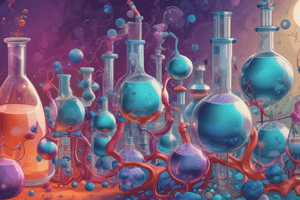Podcast
Questions and Answers
In the process of dehydrohalogenation, which mechanism is involved?
In the process of dehydrohalogenation, which mechanism is involved?
- E2 mechanism (correct)
- E1 mechanism
- SN2 mechanism
- SN1 mechanism
What type of reaction results in the addition of HX across a double bond?
What type of reaction results in the addition of HX across a double bond?
- Hydrohalogenation (correct)
- Dehydration
- Halogenation
- Oxidation
Which bond acts as a nucleophile in addition reactions to the C=C bond?
Which bond acts as a nucleophile in addition reactions to the C=C bond?
- Ionic bond
- σ bond
- π bond (correct)
- Metallic bond
What type of reaction leads to the formation of halohydrins?
What type of reaction leads to the formation of halohydrins?
Which mechanism is involved in acid-catalyzed dehydration of alcohols?
Which mechanism is involved in acid-catalyzed dehydration of alcohols?
Study Notes
Dehydrohalogenation
- Involves an elimination mechanism, specifically E2, where a hydrogen halide (HX) is removed from a substrate.
Addition of HX to Double Bonds
- Results in an electrophilic addition reaction, where HX adds across a carbon-carbon double bond.
Nucleophilic Action in Addition Reactions
- The π bond of the C=C double bond acts as the nucleophile during addition reactions, attacking electrophiles such as HX.
Formation of Halohydrins
- Occurs through a halohydrin reaction, typically involving the addition of both a halogen (X) and water (H2O) to an alkene, which can be catalyzed by an acid.
Acid-Catalyzed Dehydration of Alcohols
- Follows a mechanism known as E1, leading to the formation of alkenes when alcohols are treated with acids, resulting in the removal of water (H2O).
Studying That Suits You
Use AI to generate personalized quizzes and flashcards to suit your learning preferences.
Description
Test your knowledge on β-elimination reactions, carbocation stability, alkene stability, electrophiles & nucleophiles concepts, and the synthesis and reactions of alkenes including addition reactions like hydrogenation, addition of HX, addition of sulfuric acid, addition of halogens, halohydrins, and oxidation.




